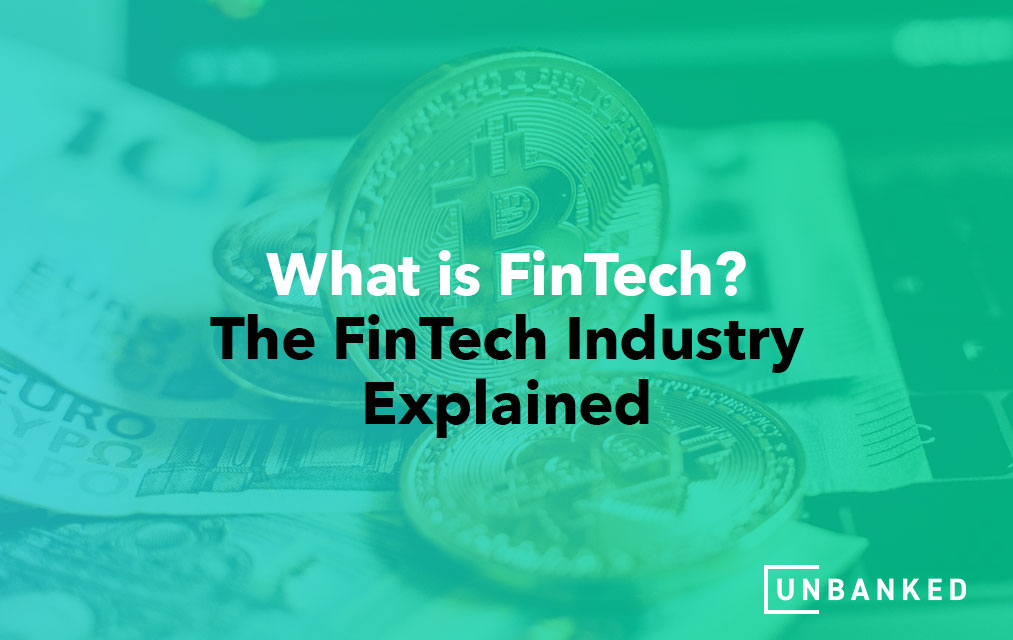What is FinTech?
To put the definition as simply as possible, financial technology (FinTech) is a term that refers to a range of innovations within the crossover space of the financial and technology worlds. It’s typically used to refer to companies or businesses that use specialized technology to provide a range of financial services to other companies, consumers, or both.
Over the past several years, FinTech has been used for many of the newest and most convenient technological innovations. It involves a vast array of developments ranging from cryptocurrency to typical mobile payment applications like PayPal. In short, FinTech can be used to describe any company or business that provides financial services through specialized technology and software.
More broadly speaking, FinTech also describes any company that uses the internet, software technology or cloud services, and mobile devices to provide consumers (or other businesses) with access to easy-to-use financial services. In doing so, FinTech has completely revolutionized how people and corporations can interact with finances while also disrupting the operations of more traditional financial industries, such as banks.
Though this has led to many convenient, time-saving innovations for corporations and consumers alike, it has also created a potential threat to brick-and-mortar banks and other older financial institutions. However, for the estimated two billion unbanked citizens worldwide, the direct access to and control of their financial lives that FinTech provides through easy-to-use technology is a massive boon. Thanks to FinTech, the overall financial inclusion of unbanked individuals has been significantly expanded, while operational costs of financial institutions have been reduced.
Today, FinTech encompasses a massive range of consumer-focused services that allow people to shop, pay for food, buy stocks, and access their checking and savings accounts. People can also manage their insurance much more directly through their smartphones and other standard pieces of technology through these FinTech services.
The various tools that FinTech has been responsible for developing have actively changed how people track, manage and interact with their finances. In 2016, as many as one in three mobile applications provided users with ways to manage their finances. This number has seen significant increases since that data was collected five years ago, especially since more and more corporations have chosen to invest directly in FinTech advancements and development.
Related: What is the Best Way to Invest Money
FinTech Examples You Should Know About

FinTech programs and capabilities have expanded massively over the past two decades, leading to a surprising number of changes and advancements in the realms of numerous industries. Below are some of the most common examples of how FinTech is being used as of 2021. While some of them involve the more traditional uses that came along with the initial development of FinTech software capabilities, many represent more recent developments in the ways that FinTech has rapidly expanded the amount of access and control people have regarding their finances.
Mobile Payments
In this day and age, one of the most commonly used elements of FinTech is mobile payments, which can quickly be conducted through countless mobile and online applications with the simple push of a few buttons. PayPal, for example, was one of the world’s first FinTech companies to be established, and its success over the years has caused it to become a globally recognized financial empire.
Other top FinTech payment companies include Venmo, Stripe, Ripple, DailyPay, Circle, Affirm, Affinipay, Bigcommerce, and several more. The use of this mobile payment technology has become so immense that, according to data collected in one report by Allied Market Research, the global mobile payment market size was last valued at $1.48 trillion as of 2019. Given that the compound annual growth rate (CAGR) of this value has been recently recorded at 30.1%, it is projected to grow to approximately $12.06 trillion by 2027.
Cryptocurrency & Blockchain Technology
Blockchain technology and cryptocurrency have become hallmark examples of FinTech software in action over several years as virtual currencies like Bitcoin, Ethereum, XRP, and countless others have come onto the scene. FinTech software has been instrumental in developing several cryptocurrency exchanges, where these currencies (along with numerous others) are continuously bought, sold, and exchanged across the globe, every day of the year. Not only did FinTech allow for the creation of these crypto exchanges and blockchain services, but it also facilitates other blockchain services.
One such service includes BlockVarify, which is utilized to help keep provenance data secured within the blockchain and help reduce instances of fraud within the cryptocurrency market. However, it’s important to note that blockchain and cryptocurrency constitute a relatively controversial use of FinTech. However, the controversy has not stopped the realms of blockchain and cryptocurrency from taking the investment world by storm in more recent years.
Robo-Advising & Stock-Trading Apps
Throughout most of investment history, investors would go through brokers and industry specialists to help them find, select, and purchase the best investments to include in their portfolios. However, in the current day and age, robo-advising through FinTech software has essentially upended traditional elements of and the overall need for services within the asset management sector. This upending is due to the range of advanced, algorithm-based portfolio management and asset recommendation tools that have increased the effectiveness and efficiency of investment strategies while significantly lowering the costs it once took to develop said strategies.
Fewer and fewer investors are relying on the skills of human investment brokers. Instead, they are turning to the advanced technology that can analyze a massive range of portfolio options every hour of the day, seven days a week, to provide them with the most profitable investment portfolio options. Even traditional financial institutions like Charles Schwab (SCHW) and Vanguard have also begun adapting to offer these online robo-investing services.
However, perhaps even more significant than the adoption of specialized robo-advising software within the FinTech space was the development of technical stock-trading mobile applications. Not long ago, investors wanting to buy, sell or exchange their investments would have to go directly to a stock market exchange, such as the Nasdaq or New York Stock Exchange (NYSE).
However, thanks to the development of FinTech, investors can now buy and sell stocks directly from their mobile devices without having to engage with any stock exchange directly. There are now many inexpensive, easy-to-use apps like Acorns and Robinhood, which make the investing process more streightforward than it has ever been.
Related: How To Invest In Stocks
Budgeting Apps
Aside from mobile payments, cryptocurrency, and stock-trading applications, one of the most common uses of FinTech over the last few years has come in the form of detailed consumer-based budgeting apps, which have recently seen a substantial surge in popularity and usage. Before the age of FinTech and advanced technology in general, people had to keep close track of their finances and develop their budgets by keeping track of their checks and navigating tedious excel spreadsheets.
However, the FinTech revolution has had a miraculous effect on spurring the development of various financial services apps that consumers can use to keep track of their expenses and income while creating an effective and easy way to manage a budgeting plan.
Crowdfunding Platforms
Crowdfunding platforms and companies, such as Patreon, Kickstarter, and GoFundMe, all serve as fantastic examples of the range of services FinTech can provide to people outside of the traditional banking industry. These platforms allow mobile app and internet users to send and receive money from others without relying on loans or other types of everyday transactions facilitated by banks.
They also allow businesses and individuals to pool significant amounts of funding together into a single space from a wide variety of sources. Back in 2000, ArtestShare became the first dedicated crowdfunding platform and a key contributor to the future development of FinTech businesses and services. Since then, several new platforms have come into creation, allowing family, friends, and fans to financially fund others through fast and easy online or app-based financial transactions.
Insurance
Another industry that FinTech advancements have significantly impacted over the past several years includes insurance. Cleverly referred to as insurtech, the intersection of financial technology and the insurance industry has permeated all levels of the insurance world, including home insurance, auto insurance, health insurance, life insurance, and even insurance for data protection. For the past several years, insurtech company startups have begun attracting massive amounts of funding. For example, according to CNBC, the insurance startup Oscar Health secured as much as $165 million at a $3.2 billion valuation in March of 2018.
Additionally, as of 2020, Forbes has decided to institute an entire insurance category to its FinTech 50 list in response to the massive leaps made by digital insurance carriers making use of specialized FinTech software to bring forth the next generation of virtual insurance brokers. Are you curious about how the stock market and cryptocurrency investing can help you improve your future financial prospects? Take a look at the top-quality resources and services offered by unBanked today to learn about what they can do for you.
Who Uses FinTech?

Now that you’ve learned the fundimentals of FinTech and what it is, it’s essential to get a clearer understanding of who primarily makes use of FinTech software and all of the innovative solutions that it has been able to provide. The three key users that people should understand include:
Average, Everyday Consumers
These are primarily the individuals that we have been referring to throughout the article up until this point. The majority of those making use of the advancements in FinTech software are ordinary, individual consumers going about their daily lives in an easier, more direct way than they once had to before FinTech innovations started hitting the market. Now that people can utilize their phones to pay bills, buy groceries, invest their income in the stock market, handle their insurance, and much more, the world has become a more manageable and more easily navigable place.
B2B (Business to Business)
Before developing financial technology, businesses and corporations would have to go through banks to store their money and obtain financing and loans. However, FinTech has provided them access to such services through technological means without requiring them to go through more traditional forms of financial services. Additionally, the development of comprehensive customer-relationship management services and cloud-based storage platforms have allowed B2B’s to interact directly with and analyze their internal financial data to try and improve the quality of their services.
Related: Different Strategies for Investing Money
B2C (Business to Client)
Much of the banking industry’s first steps into the realm of FinTech were specifically taken to develop practical B2C applications that could facilitate quick and easy lending and payment services between businesses and consumers. Now, a massive range of different companies and industries have adopted FinTech as well. In doing so, they have made it exponentially more accessible for consumers to collect and transfer money to and from businesses via their mobile devices or through internet access.
Not only has this managed to reduce the amount of attention businesses and their employees need to give to customers during financial exchanges, but it has also given a truly significant amount of power and control to consumers.
Is fintech the same as banking?
Fintech, short for financial technology, is an umbrella term that describes the new technologies and innovations within the financial services industry. It includes everything from online banking and payment processing to sophisticated investment management tools and digital currencies like Bitcoin.
In other words, fintech is a way for businesses to disrupt traditional financial services by providing more cost-effective and efficient solutions.
But fintech isn’t just about payment processing or digital currencies – it’s about transforming how people interact with their finances. From peer-to-peer lending platforms to automated investing apps, fintech is revolutionizing the way we save, invest, borrow and manage our money.
Related: TAXES ON CRYPTO: BEST GUIDE FOR 2023
Will fintech replace banks?
No, fintech isn’t about replacing banks – it’s about making traditional banking more efficient and cost-effective. For example, fintech solutions like online payment processing systems and automated investment apps are helping banks lower their costs while providing customers with faster access to services.
Ultimately, fintech is likely to have a positive effect on the banking industry by promoting competition and improving customer service.
Is fintech a B2C or B2B?
Fintech solutions can be both B2C (business to consumer) and B2B (business to business). For example, fintech companies like Stripe or PayPal provide payment processing services to both businesses and consumers.
Similarly, fintech solutions designed for wealth management are often used by financial advisors and institutions as well as individual investors. Ultimately, fintech solutions span the entire spectrum from B2C to B2B.
Why fintech is the future?
Fintech is the future of finance because it offers a number of advantages over traditional banking.
From providing faster access to services and lower costs, to giving customers more control over their finances and helping them make better decisions, fintech solutions are revolutionizing the way we save, invest and manage our money.
Is fintech a good career?
Yes, fintech is a great career choice for those interested in finance and technology. The fintech industry is growing rapidly and there are plenty of opportunities for skilled professionals to make an impact in this field.
From developing new software solutions to creating innovative financial products, fintech offers a variety of exciting job prospects for tech-savvy individuals with an aptitude for finance.
Plus, fintech careers can often pay higher salaries than traditional finance jobs – making it an attractive option for many people.
Is Amazon a fintech?
No, Amazon is not a fintech company. Instead, Amazon offers products and services related to e-commerce, cloud computing and digital media.
However, fintech solutions such as Amazon Pay and Amazon Lending are available on the platform – making it a convenient destination for fintech users looking to pay or borrow money online.
Is PayPal a fintech?
Yes, PayPal is a fintech company. Founded in 1998, PayPal provides online payment services to businesses and individuals worldwide. In addition to processing payments, PayPal also offers a range of other financial services such as peer-to-peer money transfers, merchant processing and working capital financing.
Ultimately, fintech companies like PayPal are transforming the way we save, borrow and manage our finances – making it easier than ever before for people to take control of their financial future.

Is Microsoft a fintech?
No, Microsoft is not a fintech company. However, Microsoft does provide fintech solutions such as Azure for Financial Services and Dynamics 365 for Banking. These fintech solutions are designed to help financial institutions and fintech companies better manage their data processing, customer service, and compliance needs.
Is Facebook a fintech?
No, Facebook is not a fintech company. However, fintech solutions such as Facebook Pay are available on the platform – making it a convenient destination for fintech users looking to pay or borrow money online.
Related: CRYPTOCURRENCY ARBITRAGE 101 [BEGINNER’S GUIDE]
Is Python a fintech?
No, Python is not a fintech company. However, Python is often used in fintech to build applications and systems that enable the efficient processing of financial data and transactions.
Whether you’re developing fintech solutions for AI, machine learning or payments – having strong knowledge and experience of Python programming can be invaluable.
Is fintech part of AI?
Yes, fintech is a part of AI. Artificial intelligence (AI) is used in fintech to analyze customer data and identify patterns that can help financial institutions offer more tailored services.
By leveraging machine learning and predictive analytics, fintech companies are able to make better decisions faster – leading to improved customer experiences and greater efficiency.
Final Thoughts and Considerations
The various advancements that have been made within the FinTech industry over the past two decades have been immense. They have led to significant changes in how people interact with, think about, and control their finances in the modern era. These elements are essential to keep in mind as we advance and as financial technology continues to grow, adapt, and impact different aspects of our lives.
Whether one is looking into investing in developing FinTech companies soon, or because they want to understand how FinTech has managed to alter the relationship between finances and technology, it’s essential to consider how these changes have impacted us and will likely continue to do so. And, if you would like to learn more about financial technology, the stock market, cryptocurrency, or would like to gain access to a new breed of globally accessible bank accounts with fantastic rewards, please consider taking a look at the stellar resources offered by unBanked today.
Would you like to learn about all of the benefits that come along with stock market or cryptocurrency investing? Check out the fantastic services and resources offered by unBanked to find out more about what they can do for you.





